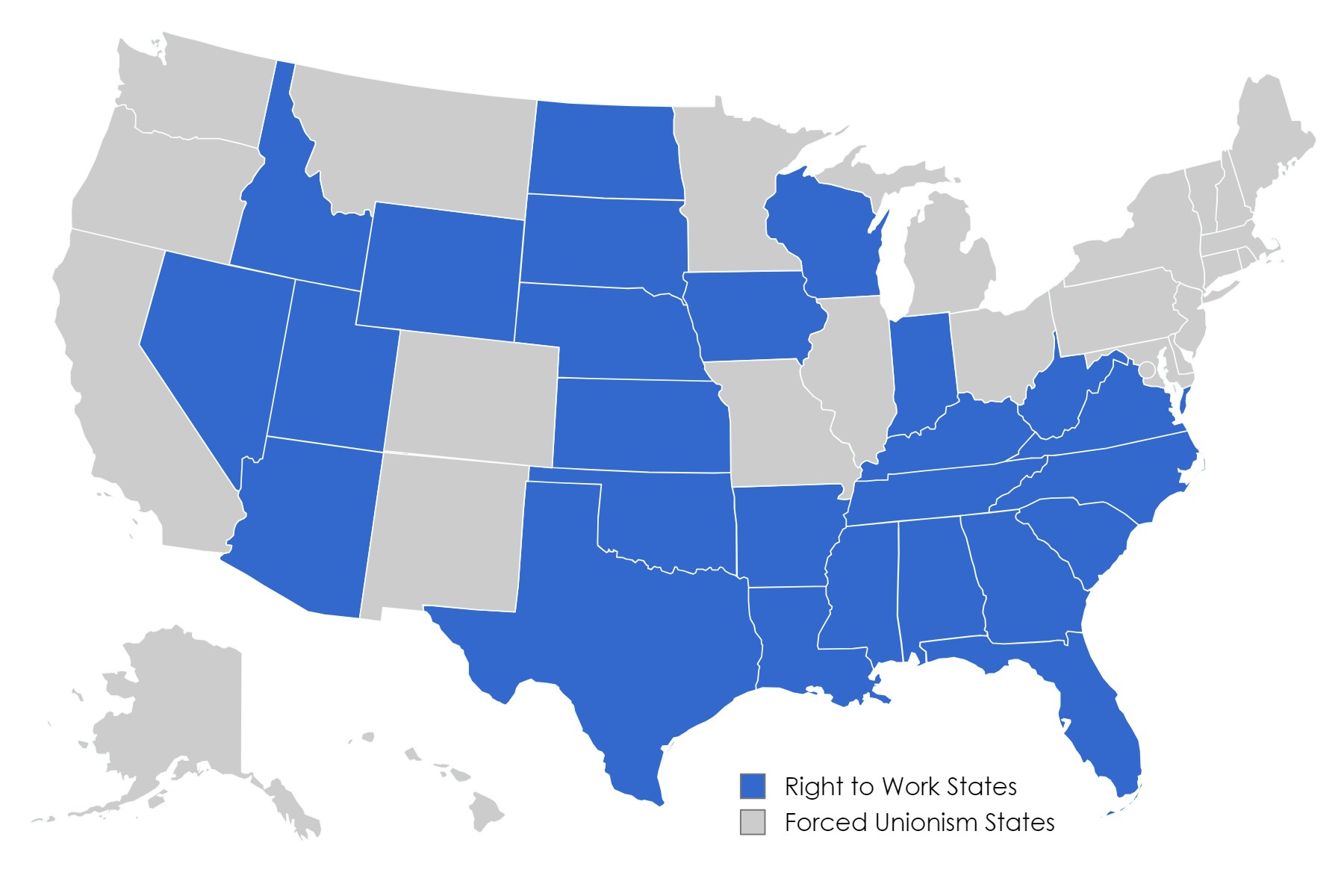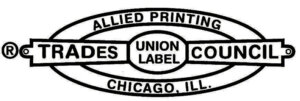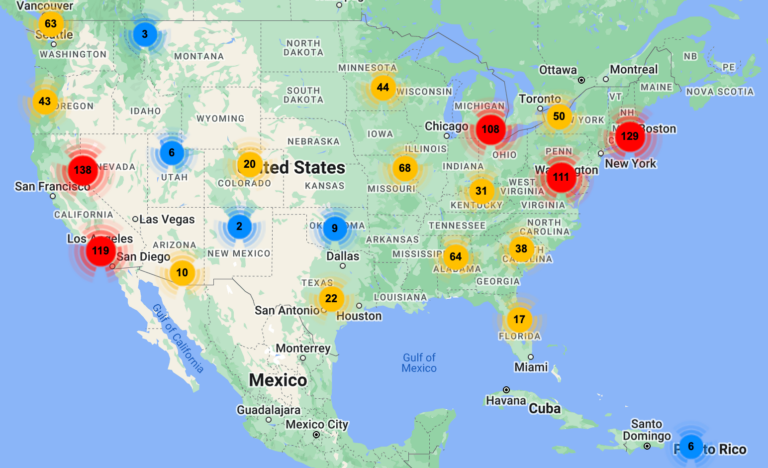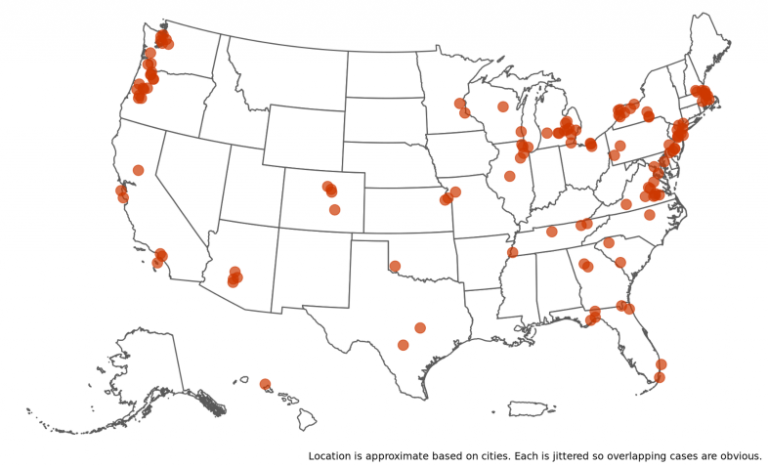A GLOSSARY OF LABOR RELATIONS TERMS
AFL-CIO – American Federation of Labor-Congress of Industrial Organizations. A labor federation of U.S.-based unions (currently comprised of 56 unions).
Agency Fees – A fee charged to a worker who refuses to join a union as a full member but, due to a union (income) security clause, is still required to pay a union as a condition of employment. To read more about union (income) security clauses, go here.
Agency Shop – A contract provision under which employees who do not join the union are required to pay a collective bargaining service fee instead. This service fee is usually the same as monthly dues. In some states public workers choose to pay service fee based on a percentage of the Union’s budget spent on representing the bargaining unit’s time and money spent on organizing and political action, not considered to be directly representing members. [Source.]
Ambulatory picketing – If a strike involves drivers of employer vehicles (e.g. delivery drivers), a striking union may establish peaceful picket lines around the vehicle at driver stops. This tactic was used effectively during the Teamster strike against UPS in 1997.
“The goal of an Ambulatory Picket is to make more visible a labor dispute and to put additional pressure on a company.” [Source.]
Annuity – A form of investment plan usually provided as a retirement plan that provides for income for a specified period of time, such as a number of years or for life. [Source.]
Arbitration – A method of settling a labor-management dispute by having an impartial third party decide the issue. The decision of the third party (arbitrator) is usually binding. [Source.]
Area Standards Picketing – A form of picketing with the purpose of encouraging an employer to observe the standards in that industry in that locality. This kind of picketing has formed legal restrictions than picketing to force an employer to recognize a union or to impress employees noneconomic benefits. [Source.]
Areawide Bargaining – Collective bargaining agreement which covers all the unionized employers and their employees in a specific geographical and industrial setting. [Source.]
Note: Although not exclusive to it, area-wide bargaining is most common in the construction industry
Assessment – An assessment is a fee charged to union members in addition to their normal dues. While some unions may allow members to vote on special assessments, other unions may pass assessments on their members without a direct vote of the affected membership.
Attrition – Attrition is a term used to describe voluntary and involuntary terminations, deaths, and employee retirements that result in a reduction to the employer’s physical workforce. [Source.]
Bargaining Agent – Union designated by a government agency, such as the National Labor Relations Board, or recognized voluntarily by the employer, as the exclusive representative of all employees in the bargaining unit for purposes of collective bargaining. [Source.]
Bargaining Unit – A group of workers who bargain collectively with the employer. The unit may include all the workers in a single location or in a number of locations, or it may include only the workers in a single craft or department. Final unit is determined by the NLRB, or agreed to jointly by the union and the employer. [Source.]
Base Rate – The straight time rate of pay, excluding premiums and incentive bonuses. [Source.]
Blitz – A union organizing tactic where a union swarms a town or city (often with out-of-town organizers) to conduct home visits on targeted employees.
Blue flu – Blue flu is a euphemistic term referring to a bargaining tactic in which law enforcement officers call in sick en masse to circumvent prohibitions against police strikes. [Source.]
Boycott – A tactic sometimes used during a labor dispute wherein a union attempts to get a company’s customers to cease using the targeted company’s services or buying a company’s products. Boycotts can have a negative impact on both the targeted company, as well as its employees and sometimes result in layoffs.
Blocking – An NLRB decision not to proceed with an election in a bargaining unit where there are unresolved unfair labor practice charges. [Source.]
Bumping Rights – Bumping rights are privileges provided to more senior-level employees whose positions have been eliminated or selected for layoff, allowing the employee with seniority to accept an alternative position that is currently occupied by a less-senior employee, resulting in the employee with less seniority being RIF’d or laid off. Bumping typically occurs in union settings as a condition of a collective bargaining agreement. [Source.]
Bylaws – A set of union rules that apply to union members at the local union level. Typically, local union bylaws are a supplemental set of rules to the international union’s constitution. For more information on union constitutions, go here.
Card Check – Procedure whereby signed authorization cards are checked against a list of employees in a prospective bargaining unit to determine if the union has majority status. The employer may recognize the union on the basis of this card check without the necessity of a formal election. Often conducted by an outside party, e.g., respected member of the community. [Source.]
Certification Bar/Election Bar – The NLRB and many public sector agencies will prohibit another election in a bargaining unit for one year after a union has been certified following an election. [Source.]
Collective Bargaining Representative – This term is used to describe a union or any other person(s) or entity which negotiates with an employer over employees’ wages, hours of work, or other terms and conditions of employment. Once certified, the collective bargaining representative (i.e., a union) represents all employees in the bargaining unit, regardless of their individual wishes, in all matters pertaining to their employment.
Community of interest – A group of factors, such as duties, skills, working conditions, reporting lines, and other job-related issues, to be considered in determining whether a group of employees should be grouped together as an appropriate bargaining unit. [Source.]
Concerted activity – Action taken by an employee or employees (generally on behalf of fellow workers) in order to improve working conditions or benefits. Federal law considers this type of activity protected from retaliation or reprisal. [Source.]
Concessionary Bargaining – A form of labor negotiations wherein the union accepts (or offers), on behalf of the employees it represents, what are known as concessions or ‘give-backs.’ For employees, concessions (or give-backs) usually translate into lower wages and/or benefits. During the period of industrial growth in the mid-20th century, concessionary bargaining was not a common practice. However, beginning in the 1970s through today, concessionary bargaining has become more and more prevalent during labor negotiations, as some unions have been willing negotiate lower wages and/or benefits for their members, for various economic reasons or to avoid a long and costly labor dispute.
The NLRB has affirmed that: “[C]ollective bargaining is potentially hazardous for employees and that as a result of such negotiations employees might possibly wind up with less benefits after unionization than before (Coach & Equipment Sales Corp; 228 NLRB 441).” [Emphasis added.]
Constructive Discharge – Constructive discharge occurs when working conditions are made so unbearable or abusive that a reasonable person believes that resignation is the only appropriate action for them to take. [Source.]
Contract (also known as Collective Bargaining Agreement or CBA)– Upon completion of the bargaining (or negotiation) process, if an agreement is reached, the result of the agreement (whether positive or negative changes for employees are made, or no changes at all) is put into the written form of a binding contract. Union contracts are binding not only on employers, but on unions and employees as well.
Contract Bar Doctrine – Once a contract is executed, the NLRB does not (usually) permit a representation election in the unit covered by the contract until the contract expires up to a 3 year limit. This rule applies to a petition by another union to represent the employees, a petition filed by the employees to decertify, or a petition filed by the employer. [Source.]
Contract Ratification – While not a legal requirement, many unions afford members the right to vote to accept or reject on a tentative contract. This process is called a ratification vote. Different unions have different methodologies to conduct ratification votes. Many unions will conduct secret-ballot ratification votes.
Note: As noted above, there is no legal requirement for a union to allow its members to vote on contracts, nor is it an unfair labor practice for a union to refuse to allow members to vote on contracts. According to the National Labor Relations Board, “Section 8(b)(1)(A) recognizes the right of unions to establish and enforce rules of membership and to control their internal affairs.” [Source.]
Corporate Campaign – The use of strategic pressure on an employer’s weak areas to gain leverage during a contract campaign or organizing drive. These campaigns involve analyzing an employer’s social, financial, and political networks and mobilizing union members and community members in a comprehensive approach which does not rely on the strike alone as the basis of the union’s power. [Source.]
Craft or Class –Unlike a “bargaining unit” under the National Labor Relations Act, a “craft or class” is group of employees covered under the Railway Labor Act (RLA) and determined by the National Mediation Board (NMB) to share a community of work and interest appropriate for collective bargaining.
Di minimus (or de minimus) – Di minimis is something that is very trifling or of little importance. Usually refers to something so small, whether in dollar terms, importance, or severity, that the law will not consider it. For example, the di minimis fringe benefit rule in tax law allows the exclusion of tax on di minimis fringe benefits. [Source.]
Also, the de minimis rule is used by the IRS to determine if a benefit provided to an employee is excluded from taxable income because the value is so small and the practice so infrequent that accounting for the value of the benefit is unreasonable or impractical. Examples of de minimis benefits include employer-provided snacks, small holiday gifts, flowers and occasional entertainment tickets. Cash or cash equivalent items such as gift cards, no matter how little, are never excludable as a de minimis benefit, except for occasional meal money or transportation fare provided to an employee working unusual or extended overtime hours. [Source.]
Disclaim Interest – A union has the right to “disclaim” its interest in representing a bargaining unit. When this occurs, the union ceases representation of the employees it had previously represented.
Dual Unionism – An individual belonging to two different labor unions. Or, a union member advocating on behalf of, or attempting to replace an existing union with a rival union to the member’s current union. Most unions prohibit members from advocating or attempting to replace the union with a rival union.
Dues – A fee paid to a union, usually on a monthly basis, by members to a union. Union dues are what a union uses to run its business, to pay its officers, union staff, their transportation, office buildings, union halls, as well as other miscellaneous expenses.
Dues Check-Off Clause – This is a union contract clause which allows a union to collect dues or service fees from the employees it represents by having the employer deduct that money from the paychecks of employees who authorize it. The money taken from the employees’ paychecks is then sent by the employer directly to the union.
Dues Skimming – The practice of a state or local government automatically deducting a portion of Medicaid or other government aid from home healthcare and family childcare (daycare) providers’ assistance checks and giving that money to government unions. [Source.]
Duty to bargain – The legally enforceable obligation of each party in a collective bargaining relationship to meet at reasonable times and places and negotiate in good faith with respect to wages, hours, and terms and conditions of employment. [Source.]
Employment-At-Will – Employment at will is a legal doctrine which states that an employment relationship may be terminated by the employer or employee at any time and for any or no reason as long as no laws are violated. Some form of employment at will is recognized in all states except Montana and can be nullified by an express or implied employment contract. [Source.]
Escape Clause – A provision in maintenance of membership union contracts giving union members an “escape period” during which they may resign from union membership. Members who do not exercise this option must remain members for the duration of the contract. [Source.]
Exclusive Bargaining Agent (also Exclusive Bargaining Representative) – A union or similar organization which has been certified in accordance with appropriate legal requirements to be the exclusive representative of all the employees in a particular bargaining unit or group and afforded recognition by the District as the exclusive bargaining agent for a group of its employees. [Source.]
“Section 9(a) of the National Labor Relations Act] provides that the employee representatives that have been ‘designated or selected for the purposes of collective bargaining by the majority of the employees in a unit appropriate for such purposes, shall be the exclusive representatives of all the employees in such unit for the purposes of collective bargaining.’” [Source (p. 12 in PDF). Emphasis added.]
Featherbedding – Featherbedding refers to an unfair labor practice that occurs when a union requires an employer to pay for services they did not perform. Examples include hiring more workers than are needed or assigning unnecessary work. [Source.]
Fees – Fees are money paid by members to a union for a variety of reasons. For example, most union swill charge initiation fees to join the union. Some unions will charge re-initiation fees, as well as other types of fees such as transfer fees (to transfer to another local union), withdrawal fees (to become either an inactive member or to withdraw from the union), etcetera.
Fine (as in Union Fine) – As most unions have rules and regulations that all union members must follow to maintain membership in good standing, if a union member violates any of the union’s rules and regulations (usually found in a union’s constitution), the member may be placed on trial by the union and, if found guilty, may be fined money. For more on union fines, go here.
“Most employees do not realize that by joining a union, they are agreeing to be bound by the union’s internal rules and regulations (which are the union’s constitution and by-laws). And further, most employees do not realize that unions’ internal rules and regulations often provide the unions with the power to: a) issue monetary fines against employees who do not “toe the union line,” and b) sue those same employees in state court to collect those fines. Typically, unions levy monetary fines against employees who cross a picket line during a strike.” Source.
Free Riders – Used in an open shop to refer to non-union members who receive all the benefits derived from collective bargaining without paying union dues or equivalent fees. [Source.]
Front Loading – The concentration of wage and benefit increases in the beginning of a contract. [Source.]
Gig Worker – Gig workers are individuals who work temporary jobs as freelancers, independent contractors, on-call workers and temporary employees to fill gaps needed by employers. Gig workers typically set their own terms. [Source.]
Good-Faith Collective Bargaining – Bargaining in “good faith” can be simply defined as the employer and union 1) meeting at reasonable times and places and 2) with an “open mind” (i.e., the intention to agree). Both unions and employers are required by law to negotiate in “good faith.” This does not mean, however, that the parties must agree. In fact, the National Labor Relations Act specifically states that the obligation to bargain “does not compel either party to agree to a proposal or require the making of a concession (National Labor Relations Act).”
As a result of good-faith collective bargaining, employees may wind up with higher wages and/or better benefits, the same wages and/or benefits, or even reduced wages and/or benefits.
Indeed, the National Labor Relations Board has affirmed that: “There is, of course, no obligation on the part of an employer to contract to continue all existing benefits, nor is it an unfair labor practice to offer reduced benefits.” (Midwest Instruments, 133 NLRB NO. 115)
Grievance – Generally, this is a formal complaint filed by the union alleging a violation, misapplication, or misinterpretation of one or more terms of the parties’ collective bargaining agreement. Collective bargaining agreements vary and may define this term differently. [Source.]
Hiring Hall – Similar to a temporary employment agency, union hiring halls are primarily found among unions in the construction industry. A union hiring hall is where a union “hires out” its members to employers who have work. Once the work or job assignment is completed, the union member returns to the hiring hall, places his name on the waiting list to be sent out for other work.
Note: A union’s waiting list of unemployed members is also commonly referred to as “the bench.”
Impasse – At a point in negotiations, usually at the final stages, when neither party will make further movement and no agreement has been reached, either party may declare that an “impasse” has occurred.
In fact, the United States Supreme Court has stated: “Indeed, as a general matter, labor law often limits employers to four options at impasse: (1) maintain the status quo, (2) implement their last offer, (3) lock out their workers (and either shut down or hire temporary replacements), or (4) negotiate separate interim agreements with the union.” Brown v. Pro Football, Inc., 518 U.S. 231
Implementation (of contract) – At the point of bona fide impasse, when an employer has made its last, best and final offer to the union, and the union does not agree to it, the employer can legally implement (or impose) that offer, thereby “forcing” terms and conditions of employment on the union and its members.
As an example, the U.S. Court of Appeals ruled that: “Where good faith bargaining has not resolved a key issue [such as wages] and where there are no definite plans for further efforts to break the deadlock, the [National Labor Relations] Board is warranted, (and perhaps sometimes even required) to make a determination that an impasse existed.” And so, the court upheld an NLRB ruling that the employer lawfully reduced wages after reaching a bargaining impasse over wages with the union. Teamsters Local 745 v. NLRB, US Court of Appeals, DC Circuit, 61 LRRM 2065)
Independent Contractor – Independent contractors are self-employed individuals who perform work on a contract basis for an employer. Independent contractors are not employees and therefore are not subject to employment tax withholding nor are they covered by most employment laws. Because of this nonemployee status, there are legal restrictions as to who can be classified as an independent contractor. Various federal government agencies and some states have their own tests to determine independent-contractor status. [Source.]
Initiation Fee – Money paid by a worker to a union to become a union member. Because the majority of today’s union members are mandated to pay a union as a condition of employment (see Union Income Security Clause), initiation fees are often in excess of $100 (and up to $1000 or more) to join a union.
Jurisdictional Dispute – Arguments among unions over which union represents workers at a job site. [Source.]
Just Cause Discipline/Termination – Just-cause termination, in contrast to employment at will, indicates an employee’s employment will not be terminated without prior notice and process of informing the employee in writing of the job performance issues. [Source.]
Also, the Seven Factors That Comprise “Just Cause”










